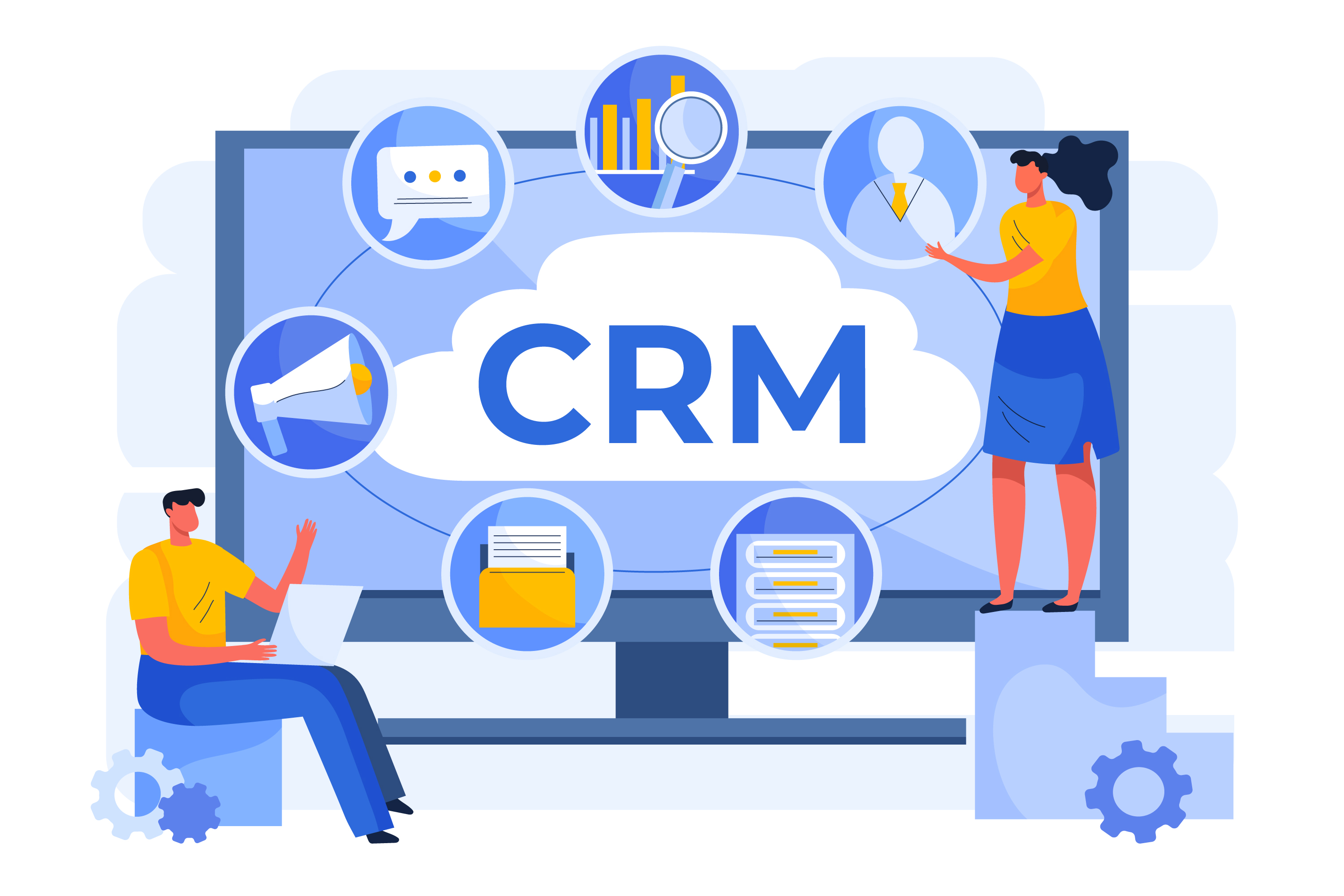![]()
In today’s digitally-driven world, businesses are constantly seeking innovative ways to connect with their customers and maximize revenue. One such transformative approach is social media integration. This fusion creates a dynamic synergy that can not only enhance customer interactions but also has a profound impact on your sales and revenue. So, without further delay let’s delve deep into the significance of CRM social media integration and how it can positively influence your company’s bottom line. But let’s take a step back to first understand the evolution of CRM and how social media integration came into play.
The Evolution of CRM

Customer Relationship Management (CRM) has come a long way, from being the rolodexes of the past, today’s CRM systems have evolved as comprehensive digital systems. Traditionally, CRM systems were primarily used to collect and organize customer data, which was essential but limited in scope. With technological advancement, CRM evolved as well, and today, CRM is a multifaceted tool that goes beyond data management. It has evolved into a strategic approach that focuses on building strong relationships with customers.
Entry of Social Media

The rise of social media has fundamentally changed the way businesses and customers interact. Beyond the use for personal connections, social media channels like Facebook, Twitter, Instagram, and LinkedIn have become gold mines for businesses. The unique opportunities that these social media channels provide for reaching out to a global audience, engaging with customers in real-time, and gathering valuable insight into customer preferences and behaviors, have made it one of the best ways to attract customers and increase sales. So, now let’s explore why you should think of integrating social media with your CRM systems.
Why Integrate Social Media and CRM?

Here’s how CRM social media integration can benefit you:
- Improved Customer Insights
One of the primary advantages of CRM social media integration is the wealth of customer data that you get access to. While traditional CRM systems rely on customer-provided data and transaction history, social media integration can take you a step further by offering a continuous stream of insights. Social media integration also allows you to engage with your customers through interactions, likes, shares, comments, and direct messages, which provides you with a deeper understanding of your customers, their preferences, and their pain points. With this invaluable information in hand, you can eventually enable you to tailor your products and services to meet customer demands.
- Enhanced Customer Engagement
Social media is all about engagement, and customers expect brands to be present on these platforms, ready to respond to queries and comments promptly. Social media integration with CRM can allow you to provide seamless and real-time customer service. Social media integration with CRM can automatically log customer interactions into the CRM system. This will ensure that your customer’s history and context are readily available to your customer service representatives, which can empower you to provide personalized interactions and quality customer service.
- Targeted Marketing
Today’s social media platforms provide diverse advertising and targeting options, and with social media integration you can leverage these opportunities, as social media integration allows businesses to create highly specific customer segments. You can easily target these segments with tailored ads and content, to enhance your marketing campaigns. Plus, as social media integration allows you to integrate customer responses captured from marketing campaigns into the CRM, it will further empower your marketing team to refine the customer profile.
- Sales Opportunities
Social media provides a unique opportunity for businesses to discover sales leads. By monitoring social media conversations, you can identify potential customers expressing interest or dissatisfaction with products or services. CRM social media integration will allow you to do just that by enabling you to seamlessly add these prospects to the CRM system, which in return will allow your sales team to follow up and convert prospects into paying customers.
- Strengthened Customer Loyalty
You need loyal customers to survive in this competitive market, with social media integration you can build brand loyalists, as this system can enable you to nurture customer relationships by tracking their preferences and purchase history. With this abundant customer data in hand, you can also create loyalty programs and offer reward programs aligning with individual customer interests to retain your customers and influence them to make repeated purchases.
- Improved Data Analysis
Social media integration with your CRM systems can give you access to an abundance of data. By analyzing this data, you can easily identify trends, patterns, and customer behavior, which will allow you to optimize your sales and marketing strategies to make them more efficient and effective for driving revenue growth.
- Faster Sales Cycles
CRM social media integration can also promote collaboration between your sales and marketing teams as it makes communication easy and seamless. Both your sales and marketing teams can easily access customer data and insights, this on the other hand will also ensure that your sales team can engage with potential customers at the right movement. This real-time engagement can significantly shorten your sales cycle and increase the likelihood of your salespeople closing deals more quickly.
- Improved Cross-Selling and Upselling
CRM social media integration can also enable you to identify cross-selling and up-selling opportunities. By analyzing the customer data that the CRM system collects and stores under a unified database, you can suggest complementary products or services to your customers, which will increase your average transaction value and boost your revenue.
The Impact of CRM Social Media Integration on Sales and Revenue
![]()
Here’s how CRM social media integration can directly impact your sales and revenue:
- Improved Lead Generation and Conversion
One of the most direct impacts of CRM social media integration on sales is that it can enhance lead generation and conversion rates. Social media platforms are beaming with potential leads, as users discuss their needs, challenges, and preferences openly, and social media integration can collect, clean, sort, and analyze these data to provide your teams a holistic view of the customers, which will enable them to capture and qualify leads more effectively. The other ways social media integration improves lead generation and conversion include:
- Real-time Lead Capture: Social media interactions can serve as a real-time source of leads. With social media integration you can capture these leads, as these systems can seamlessly capture and record data from user engagement.
- Lead Scoring and Prioritization: CRM social media integration can also assign scores to your lead based on the level of engagement and the user’s profile data. This can enable your sales team to prioritize leads and focus their efforts on the most promising prospects, to enhance the overall sales processes.
- Personalized Nurturing: Armed with the data from your social media integration, you can create personalized nurturing sequences and targeted content for different segments of your audience. This relevant content and offers will increase your chances of converting leads into paying customers.
2. Enhanced Customer Retention
Customer retention plays a vital role in increasing revenue, as the cost of acquiring a new customer is significantly higher than retaining an existing one, and CRM social media integration can be a powerful tool in enhancing customer loyalty and reducing churn. So, let’s see how social media integration can enhance your customer retention efforts:
- Personalized Customer Service: Social media serves as an excellent platform for providing personalized customer service. When customers reach out on social media with questions, concerns, or feedback,social media integration can ensure that your support team has immediate access to the customer’s history and context. This can not only facilitate faster issue resolution but make customers feel valued, as well, which can contribute to their loyalty.
- Loyalty Programs: CRM systems can track and manage loyalty programs, which will help you provide rewards for their repeat business and referrals. social media integration can also empower you to promote these programs and share them on the social media platforms, to encourage customer engagement and further purchases.
- Proactive Relationship Building: CRM social media integration can enable you to proactively build relationships with customers. By allowing you to monitor and respond to customer sentiments and feedback on social media,social media integration can empower you to address issues before they escalate, which will create more satisfied and loyal customers.
3. Personalized and Targeted Marketing Campaigns
CRM social media integration can also enable you to create highly personalized marketing campaigns, by providing you and your team’s 360 view of customer profiles. This enhanced understanding of customers and their needs will empower you and your teams to create personalized marketing campaigns that can resonate with your customers and make them feel valued. The ways by which social media integration improves marketing campaigns include:
- Customer Segmentation: CRM systems store a wealth of data about your customers and as CRM social media integration integrates this data with social media insights, it can enable you to create detailed customer segments based on demographics, behaviors, and preferences. This, in turn, will allow you to create highly targeted marketing campaigns that are more likely to convert.
- Personalized Content: Leveraging the abundant data that CRM social media integration collects, cleans, sorts, and stores in a unified database, you can create personalized content for different customer segments. This will help you increase customer engagement and conversion rates, as tailored emails, social media posts, or ads, are proven ways of keeping customers satisfied and influencing them to make purchases.
- Remarketing: CRM social media integration can also facilitate your remarketing efforts with its abandoned cart campaigns feature. It is in customers’ nature to often abandon shopping carts or show interest in specific products, with social media integration you can also retarget them with relevant ads on social media platforms. This will increase your chances of converting visitors into paying customers.
4. Increased Cross-Selling and Upselling Opportunities
Social media integration with CRM systems can provide you with the opportunities to upsell and cross-sell products and services, thereby boosting the average transaction value and revenue, let’s see how:
- Understanding Customer Behavior: By analyzing customer interactions on social media and purchase history collected and stored by social media integration, you can gain insights into customer preferences and buying patterns. This knowledge will eventually allow you to make informed recommendations for additional purchases to effectively drive revenue growth.
- Customized Offers: The data collected by CRM social media integration can enable you to create customized offers and bundles that align with individual customer interests and past purchases. By presenting these offers on social media, you can encourage customers to make additional purchases.
5. Real-time Competitive Analysis
Social media is not only a platform for customer interaction it also serves as a valuable source of competitive intelligence. CRM social media integration allows you to monitor and react to competitive activities effectively. So, let’s see how social media integration can help you with real-time competitive analysis:
- Monitoring Competitors: By tracking the social media activities of your competitors, CRM social media integration enables you to gain insights into their marketing strategies, product launches, customer engagement, and customer sentiment. This information can help you adjust your strategies, while potentially allowing you to capture market share and increase your revenue.
- Capitalizing on Trends: Social media is often the first place where emerging trends and customer sentiments become visible. Social media integration can integrate these insights into your CRM system, which will enable you to adapt quickly, capitalize on trends, and tailor your products or services to meet changing customer demands.
Conclusion

Social media integration with CRM can be your best ally, if you are seeking to maximize your sales and revenue. The seamless connection between social media and CRM systems offers a wealth of benefits, from improved customer insights and engagement to targeted marketing campaigns and enhanced customer loyalty, which can help you in many ways. So, to offer personalized experiences, quick responses, and meaningful engagement, to your customers you should consider social media integration at the earliest. This will help you enjoy increased conversion while enabling you to turn your customers into brand loyalists.